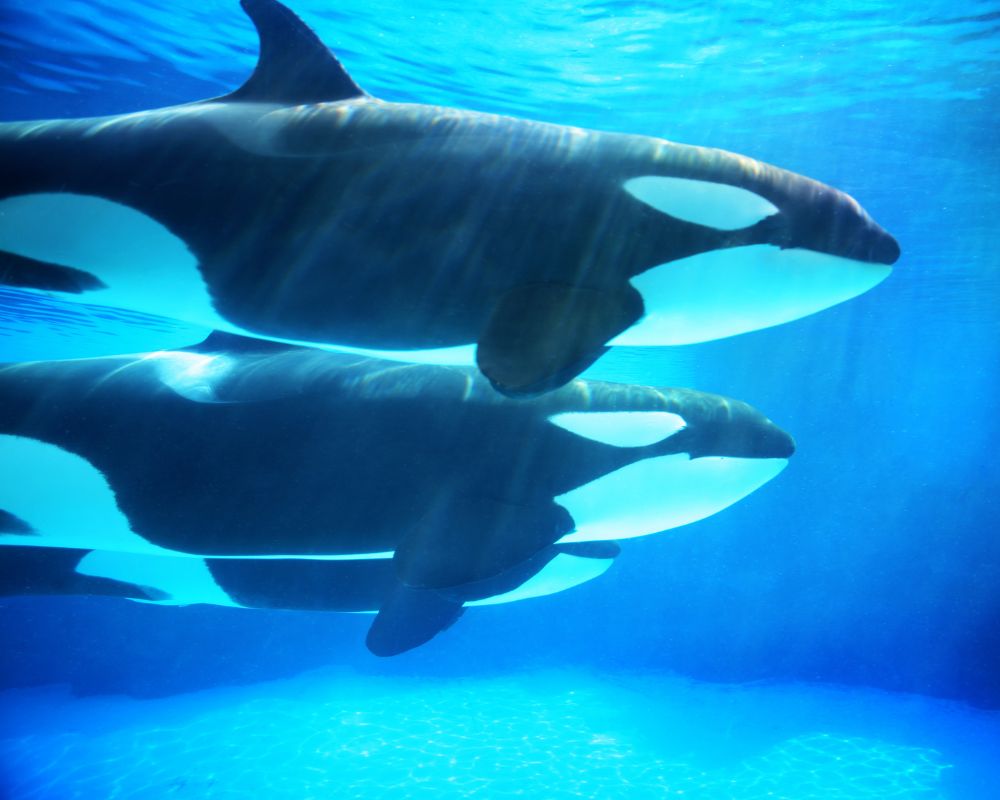Whales are some of the most fascinating creatures on our planet. Their massive size, graceful movements, and haunting songs have captivated humans for centuries.
One question that’s often asked is whether whales can have twins. It’s a curious question that piqued my interest as well.
If you’re reading this, chances are you’re curious too. So, let’s explore the answer together and dive into the fascinating world of whale reproduction.
Can Whales Have Twins?

As we’ve already established, twin births are pretty rare in the animal kingdom. And when it comes to whales, the odds of having twins are even lower. But, is it possible? Let’s find out.
Twin births in whales are incredibly rare. In fact, twin births have only been documented a handful of times in certain whale species.
This is because most whale species have a very low rate of reproduction, with females only giving birth once every two to three years.
Factors That Affect The Likelihood Of Twin Births In Whales:
There are several factors that affect the likelihood of twin births in whales:
- Species of whales: Some whale species are more likely to have twin births than others. For example, humpback whales have a slightly higher chance of giving birth to twins than other species.
- Age of the female whale: Younger female whales are less likely to have twin births than older females. This is because older females tend to release more than one egg during ovulation, increasing the chances of twins.
- Environmental factors: Environmental factors such as food availability, water temperature, and climate change can also affect the likelihood of twin births in whales.
Examples Of Whale Species That Have Been Known To Have Twin Births
While twin births are rare in most whale species, there have been a few documented cases of twin births in humpback and gray whales.
In fact, one of the most well-known cases of twin births in whales occurred in 2016 when a humpback whale was spotted off the coast of Hawaii with two calves swimming beside her. It was a rare and exciting sight for researchers and whale enthusiasts alike.
Other whale species that have the potential for twin births include fin whales, minke whales, and southern right whales.
In the next section, I am going to talk more about the reproduction of whales to understand the possibility of twins better.
Overview of Whales and Reproduction
Whales are a diverse group of marine mammals, with over 80 different species found throughout the world’s oceans.
They range in size from the small dwarf sperm whale, which can be less than 9 feet long, to the massive blue whale, which can grow up to 100 feet long and weigh over 200 tons.
Mating Habits Of Whales
Whales have complex mating habits that vary between species. Some species, like humpback whales, have elaborate courtship rituals that involve singing and acrobatic displays.
Other species, like grey whales, have more straightforward mating habits, with males competing for the attention of females.
Gestation Period Of Whales
Whale gestation periods can range from 9 to 18 months, depending on the species. During this time, the female whale will carry her developing calf in her uterus.
Birth Of A Whale Calf
When it’s time for the calf to be born, the female whale will typically swim to shallow waters to make birth easier. The calf will emerge tail first and will be assisted by the mother in reaching the surface to take its first breath.
Caring For Whale Calves
After birth, the mother whale will nurse her calf with nutrient-rich milk, which helps the calf to grow and develop.
In some species, like the humpback whale, both the mother and father will care for the calf for several months before it is weaned.[1]
Twin Whale Calves: Challenges and Adaptations
When it comes to giving birth to twin whale calves, it’s not all sunshine and rainbows for the mother whale. In fact, it can be quite a challenge.
The Challenges Of Giving Birth To Twin Whale Calves
There are 2 main challenges:
1. Physical Stress On The Mother
Giving birth to just one whale calf is already a physically demanding process, so imagine the added stress of giving birth to two at the same time.
It takes a lot of energy and strength for the mother whale to push out two calves, and it can put a significant amount of strain on her body.
2. Competition For Milk And Care
After the birth, the mother whale has to care for two hungry and growing calves. However, the competition for milk and attention can be intense between the two siblings.
The calves need to feed frequently to grow and develop properly, which means the mother whale must divide her attention and resources between both of them.
The Adaptations Of Twin Whale Calves
To overcome the challenges of competition and increase their chances of survival, twin whale calves often develop a strong bond and sense of cooperation. They will work together to secure more milk from their mother and stay close to each other for warmth and protection.
Twin whale calves also exhibit synchronized behavior and communication, which helps them navigate their environment and stay safe. They may swim together in unison, coordinate their breathing and diving, and vocalize to stay in contact with each other.
One species of whale known to have twin births is the Southern right whale. Observations of twin calves in this species have shown that they exhibit synchronized behavior and communication, as well as increased cooperation between siblings.
While twin births are rare in most whale species, other species with the potential for twin births include humpback and gray whales. However, there is still much research to be done in understanding the likelihood and adaptations of twin whale calves in these species.
FAQs
Can Whales Have Multiple Babies?
Some whale species can have multiple babies, but it is very rare. Twin births are the most common type of multiple births in whales, but even they are extremely uncommon.
Can Orcas Give Birth To Twins?
Yes, orcas are known to have twin births. However, twin births in orcas are also rare, and only a few cases have been documented.
Can Humpback Whales Have Twins?
Yes, humpback whales can have twins, but it is a very rare occurrence. Only a handful of cases have been documented in the wild.
Can Humpback Whales Have More Than One Baby?
It is possible for humpback whales to have more than one baby, but it is extremely rare. Twin births are the most common type of multiple births in humpback whales, but even they are very uncommon.

